 I have no idea how to begin this one. I had thought about leading with a riff about the brand of charismatic actress who's never actually good but steers assiduously clear of ever being bad. I had thought about talking about how early career Supporting Actress nominations provide an easy alibi for "category fraud." I had thought about opening with a salvo about my weakness for actresses who know how to act with their hair. But none of those strategies seemed to actually amount to much. An apt enough description, I suppose, for my general feelings about...
I have no idea how to begin this one. I had thought about leading with a riff about the brand of charismatic actress who's never actually good but steers assiduously clear of ever being bad. I had thought about talking about how early career Supporting Actress nominations provide an easy alibi for "category fraud." I had thought about opening with a salvo about my weakness for actresses who know how to act with their hair. But none of those strategies seemed to actually amount to much. An apt enough description, I suppose, for my general feelings about...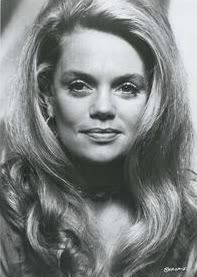
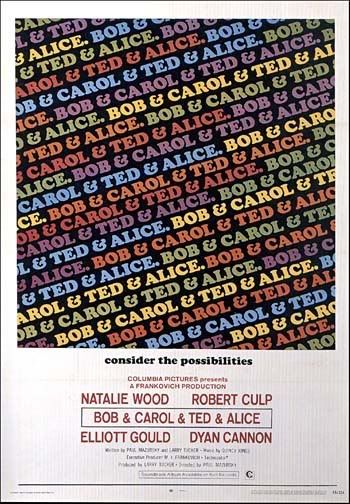
...Dyan Cannon in Bob & Carol & Ted & Alice (1969)
approximately 50 minutes and 12 seconds
14 scenes
roughly 48% of film's total running time
Dyan Cannon plays Alice, a wealthy and fairly sophisticated Hollywood wife (to Elliot Gould's Ted, at what is likely the very brief apex of the actor's career as a near-hunk).
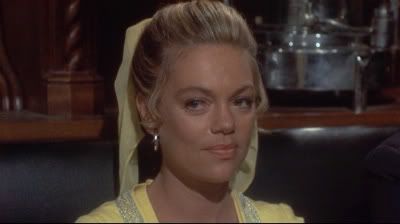 Cannon's Alice happens also to be best friends with Bob and Carol (Robert Culp and Natalie Wood, respectively) -- a comparably privileged couple recently radicalized by their attendance at a weekend "Encounter Group".
Cannon's Alice happens also to be best friends with Bob and Carol (Robert Culp and Natalie Wood, respectively) -- a comparably privileged couple recently radicalized by their attendance at a weekend "Encounter Group".
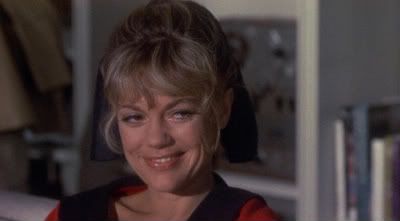 As Bob and Carol enthusiastically share the dimensions of their new appreciation of real intimacy, Cannon's Alice discovers -- somewhat to her own surprise -- the latent conventionality of her own core beliefs about friendship, marriage and, especially, sex. When Wood's Carol reveals not only that Culp's Bob had an affair, but also that she -- Carol -- is absolutely "fine" with it, the news rocks Alice's foundation to the core.
As Bob and Carol enthusiastically share the dimensions of their new appreciation of real intimacy, Cannon's Alice discovers -- somewhat to her own surprise -- the latent conventionality of her own core beliefs about friendship, marriage and, especially, sex. When Wood's Carol reveals not only that Culp's Bob had an affair, but also that she -- Carol -- is absolutely "fine" with it, the news rocks Alice's foundation to the core.
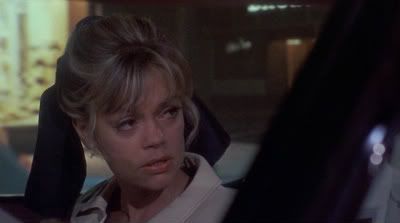 At first, Cannon's Alice reacts to the news of Carol's acceptance of Bob's infidelity with disbelief, a brief stage of denial that also marks the first node in the core emotional arc of the film (an arc marked by Alice's subsequent scenes) as both Alice and the audience absorb the full dimensions of Bob and Carol's "new" approach to marital intimacy -- an open marriage in which full emotional disclosure serves, at least theoretically, to fortify the integrity of the marital bond.
At first, Cannon's Alice reacts to the news of Carol's acceptance of Bob's infidelity with disbelief, a brief stage of denial that also marks the first node in the core emotional arc of the film (an arc marked by Alice's subsequent scenes) as both Alice and the audience absorb the full dimensions of Bob and Carol's "new" approach to marital intimacy -- an open marriage in which full emotional disclosure serves, at least theoretically, to fortify the integrity of the marital bond.
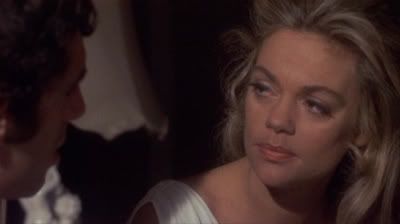 When Cannon's Alice realizes that Gould's Ted is not especially shocked by either Bob's affair or Carol's acceptance of it, and when she figures out that Ted is mostly appalled that Bob told Carol in the first place, Alice's denial dematerializes and a startling mix of fury and fear take over. In this extended, erratic and somewhat exhausting scene, Cannon's Alice realizes that the revelation has not simply changed how she thinks of her friends' marriage but also how she thinks of her own. With this turn, Cannon's Alice emerges as both the emotional protagonist of the film as well as the character who will perform as the audience's surrogate. The experiment may be Bob and Carol's (and Ted may try part of the experiment himself) but the film offers Alice's uneasy encounter with the idea of "open marriage" as an empathetic guide for a presumably similarly discomfited audience.
When Cannon's Alice realizes that Gould's Ted is not especially shocked by either Bob's affair or Carol's acceptance of it, and when she figures out that Ted is mostly appalled that Bob told Carol in the first place, Alice's denial dematerializes and a startling mix of fury and fear take over. In this extended, erratic and somewhat exhausting scene, Cannon's Alice realizes that the revelation has not simply changed how she thinks of her friends' marriage but also how she thinks of her own. With this turn, Cannon's Alice emerges as both the emotional protagonist of the film as well as the character who will perform as the audience's surrogate. The experiment may be Bob and Carol's (and Ted may try part of the experiment himself) but the film offers Alice's uneasy encounter with the idea of "open marriage" as an empathetic guide for a presumably similarly discomfited audience.
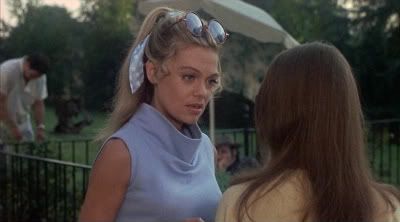 Thus, we see Cannon chart the next nodes of Alice's journey to acceptance, when Cannon's Alice first checks with Wood's Carol to see that it's all true...
Thus, we see Cannon chart the next nodes of Alice's journey to acceptance, when Cannon's Alice first checks with Wood's Carol to see that it's all true...
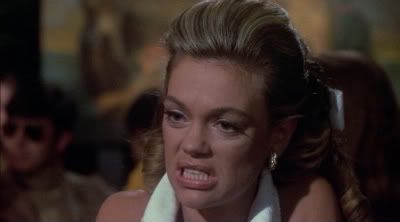 Before Cannon's Alice finally gives impolite vent to her true feelings of disgust and dismay at the choices her beloved friends are making.
Before Cannon's Alice finally gives impolite vent to her true feelings of disgust and dismay at the choices her beloved friends are making.
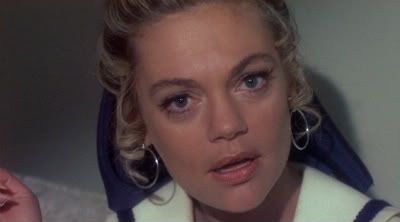 This outburst leads, perhaps inevitably, to Cannon's Alice talking about it all in therapy, where she, perhaps also inevitably, learns that her own sexual hang-ups are the true root of her resistance to Bob and Carol's new way of marriage. Throughout this concentrated sequence of scenes, in which Cannon's Alice provides the narrative and cinematic focus, Cannon performs the twists and turns of Alice's journey with alacrity. The actress's doll-like face and body combine with her palpable energy to create a character we are inclined to like, and to root for, even when we don't entirely understand what the character's doing. Indeed, Cannon's performance does little to illuminate the nuance of Alice's dilemma but, nevertheless, Cannon's forceful, uncomplicated charisma impels us to attentively follow the character's dilemma anyway.
This outburst leads, perhaps inevitably, to Cannon's Alice talking about it all in therapy, where she, perhaps also inevitably, learns that her own sexual hang-ups are the true root of her resistance to Bob and Carol's new way of marriage. Throughout this concentrated sequence of scenes, in which Cannon's Alice provides the narrative and cinematic focus, Cannon performs the twists and turns of Alice's journey with alacrity. The actress's doll-like face and body combine with her palpable energy to create a character we are inclined to like, and to root for, even when we don't entirely understand what the character's doing. Indeed, Cannon's performance does little to illuminate the nuance of Alice's dilemma but, nevertheless, Cannon's forceful, uncomplicated charisma impels us to attentively follow the character's dilemma anyway.
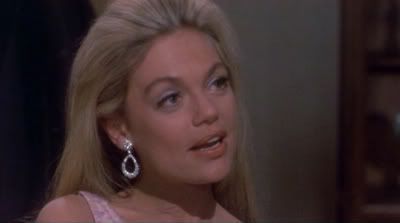 Yet, at the same time as Cannon's Alice steadily becomes a reluctant "convert" to the idea of emotional and sexual openness in marriage, the other three characters have begun to encounter crises of faith. So, when Cannon's Alice somewhat naively asks a question shortly after the foursome have checked into their Las Vegas hotel suite, the cascade of revelations that follows occasions a new crisis of faith for Cannon's Alice. Incongruously, but in keeping with the erratic logic of the film, Cannon's Alice giddily insists that the foursome reaffirm their commitment to this new ideology of intimacy through a communal sacrament of sorts -- an orgy! -- the occasion of which Cannon's Alice pronounces with a fervently maniacal zeal.
Yet, at the same time as Cannon's Alice steadily becomes a reluctant "convert" to the idea of emotional and sexual openness in marriage, the other three characters have begun to encounter crises of faith. So, when Cannon's Alice somewhat naively asks a question shortly after the foursome have checked into their Las Vegas hotel suite, the cascade of revelations that follows occasions a new crisis of faith for Cannon's Alice. Incongruously, but in keeping with the erratic logic of the film, Cannon's Alice giddily insists that the foursome reaffirm their commitment to this new ideology of intimacy through a communal sacrament of sorts -- an orgy! -- the occasion of which Cannon's Alice pronounces with a fervently maniacal zeal.
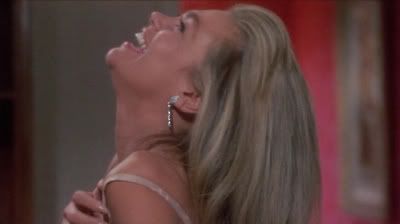 And just as quickly as the orgy begins...
And just as quickly as the orgy begins...
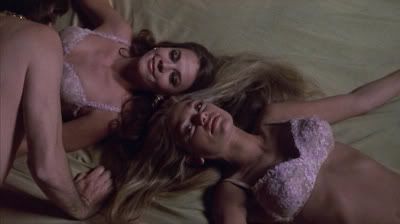 it stops, as the characters contemplate the inevitable consequences of having sex with your best friends.
it stops, as the characters contemplate the inevitable consequences of having sex with your best friends.
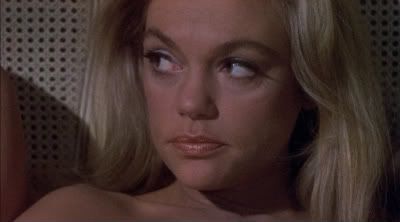 And then Bob and Carol and Ted and Cannon's Alice put all their clothes back on and collectively hits the street for a spontaneous, surreal "encounter group" with the multicultural denizens of Las Vegas marching two by two down the Strip (a sequence I think I don't really understand at all and which strikes me as a "we don't know how to end this movie" kind of hail mary choice).
And then Bob and Carol and Ted and Cannon's Alice put all their clothes back on and collectively hits the street for a spontaneous, surreal "encounter group" with the multicultural denizens of Las Vegas marching two by two down the Strip (a sequence I think I don't really understand at all and which strikes me as a "we don't know how to end this movie" kind of hail mary choice).
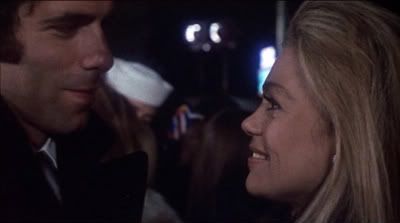 As the couples reconfigure in a conclusion of dyadic harmony, Cannon's Alice reaffirms her tacitly monogamous commitment to her husband. Indeed, at this moment, Alice emerges as the almost salvific figure in this troubled narrative of heterosexual, marital monogamy -- the single figure of the foursome to have not actually committed infidelity even as she traveled and weathered its emotional terrain.
As the couples reconfigure in a conclusion of dyadic harmony, Cannon's Alice reaffirms her tacitly monogamous commitment to her husband. Indeed, at this moment, Alice emerges as the almost salvific figure in this troubled narrative of heterosexual, marital monogamy -- the single figure of the foursome to have not actually committed infidelity even as she traveled and weathered its emotional terrain.
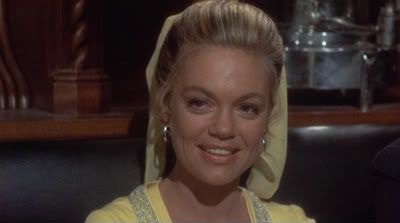 All told, I remain uncertain what I think of Cannon's performance in what is arguably the film's most important (and even possibly leading) role of Alice. Cannon's Alice is vivid, captivating and appealing -- yet she remains a cipher. And given that Alice is possibly the most important character in this four-hander, that might prove a problem...if, that is, the film cared at all about making a clear statement upon its designedly provocative premise. Indeed, Cannon delivers both a befuddling performance and a starmaking turn. In short, Dyan Cannon may be a muddle but she's memorable, much like the film itself.
All told, I remain uncertain what I think of Cannon's performance in what is arguably the film's most important (and even possibly leading) role of Alice. Cannon's Alice is vivid, captivating and appealing -- yet she remains a cipher. And given that Alice is possibly the most important character in this four-hander, that might prove a problem...if, that is, the film cared at all about making a clear statement upon its designedly provocative premise. Indeed, Cannon delivers both a befuddling performance and a starmaking turn. In short, Dyan Cannon may be a muddle but she's memorable, much like the film itself.
 Cannon's Alice happens also to be best friends with Bob and Carol (Robert Culp and Natalie Wood, respectively) -- a comparably privileged couple recently radicalized by their attendance at a weekend "Encounter Group".
Cannon's Alice happens also to be best friends with Bob and Carol (Robert Culp and Natalie Wood, respectively) -- a comparably privileged couple recently radicalized by their attendance at a weekend "Encounter Group". As Bob and Carol enthusiastically share the dimensions of their new appreciation of real intimacy, Cannon's Alice discovers -- somewhat to her own surprise -- the latent conventionality of her own core beliefs about friendship, marriage and, especially, sex. When Wood's Carol reveals not only that Culp's Bob had an affair, but also that she -- Carol -- is absolutely "fine" with it, the news rocks Alice's foundation to the core.
As Bob and Carol enthusiastically share the dimensions of their new appreciation of real intimacy, Cannon's Alice discovers -- somewhat to her own surprise -- the latent conventionality of her own core beliefs about friendship, marriage and, especially, sex. When Wood's Carol reveals not only that Culp's Bob had an affair, but also that she -- Carol -- is absolutely "fine" with it, the news rocks Alice's foundation to the core. At first, Cannon's Alice reacts to the news of Carol's acceptance of Bob's infidelity with disbelief, a brief stage of denial that also marks the first node in the core emotional arc of the film (an arc marked by Alice's subsequent scenes) as both Alice and the audience absorb the full dimensions of Bob and Carol's "new" approach to marital intimacy -- an open marriage in which full emotional disclosure serves, at least theoretically, to fortify the integrity of the marital bond.
At first, Cannon's Alice reacts to the news of Carol's acceptance of Bob's infidelity with disbelief, a brief stage of denial that also marks the first node in the core emotional arc of the film (an arc marked by Alice's subsequent scenes) as both Alice and the audience absorb the full dimensions of Bob and Carol's "new" approach to marital intimacy -- an open marriage in which full emotional disclosure serves, at least theoretically, to fortify the integrity of the marital bond. When Cannon's Alice realizes that Gould's Ted is not especially shocked by either Bob's affair or Carol's acceptance of it, and when she figures out that Ted is mostly appalled that Bob told Carol in the first place, Alice's denial dematerializes and a startling mix of fury and fear take over. In this extended, erratic and somewhat exhausting scene, Cannon's Alice realizes that the revelation has not simply changed how she thinks of her friends' marriage but also how she thinks of her own. With this turn, Cannon's Alice emerges as both the emotional protagonist of the film as well as the character who will perform as the audience's surrogate. The experiment may be Bob and Carol's (and Ted may try part of the experiment himself) but the film offers Alice's uneasy encounter with the idea of "open marriage" as an empathetic guide for a presumably similarly discomfited audience.
When Cannon's Alice realizes that Gould's Ted is not especially shocked by either Bob's affair or Carol's acceptance of it, and when she figures out that Ted is mostly appalled that Bob told Carol in the first place, Alice's denial dematerializes and a startling mix of fury and fear take over. In this extended, erratic and somewhat exhausting scene, Cannon's Alice realizes that the revelation has not simply changed how she thinks of her friends' marriage but also how she thinks of her own. With this turn, Cannon's Alice emerges as both the emotional protagonist of the film as well as the character who will perform as the audience's surrogate. The experiment may be Bob and Carol's (and Ted may try part of the experiment himself) but the film offers Alice's uneasy encounter with the idea of "open marriage" as an empathetic guide for a presumably similarly discomfited audience. Thus, we see Cannon chart the next nodes of Alice's journey to acceptance, when Cannon's Alice first checks with Wood's Carol to see that it's all true...
Thus, we see Cannon chart the next nodes of Alice's journey to acceptance, when Cannon's Alice first checks with Wood's Carol to see that it's all true... Before Cannon's Alice finally gives impolite vent to her true feelings of disgust and dismay at the choices her beloved friends are making.
Before Cannon's Alice finally gives impolite vent to her true feelings of disgust and dismay at the choices her beloved friends are making. This outburst leads, perhaps inevitably, to Cannon's Alice talking about it all in therapy, where she, perhaps also inevitably, learns that her own sexual hang-ups are the true root of her resistance to Bob and Carol's new way of marriage. Throughout this concentrated sequence of scenes, in which Cannon's Alice provides the narrative and cinematic focus, Cannon performs the twists and turns of Alice's journey with alacrity. The actress's doll-like face and body combine with her palpable energy to create a character we are inclined to like, and to root for, even when we don't entirely understand what the character's doing. Indeed, Cannon's performance does little to illuminate the nuance of Alice's dilemma but, nevertheless, Cannon's forceful, uncomplicated charisma impels us to attentively follow the character's dilemma anyway.
This outburst leads, perhaps inevitably, to Cannon's Alice talking about it all in therapy, where she, perhaps also inevitably, learns that her own sexual hang-ups are the true root of her resistance to Bob and Carol's new way of marriage. Throughout this concentrated sequence of scenes, in which Cannon's Alice provides the narrative and cinematic focus, Cannon performs the twists and turns of Alice's journey with alacrity. The actress's doll-like face and body combine with her palpable energy to create a character we are inclined to like, and to root for, even when we don't entirely understand what the character's doing. Indeed, Cannon's performance does little to illuminate the nuance of Alice's dilemma but, nevertheless, Cannon's forceful, uncomplicated charisma impels us to attentively follow the character's dilemma anyway. Yet, at the same time as Cannon's Alice steadily becomes a reluctant "convert" to the idea of emotional and sexual openness in marriage, the other three characters have begun to encounter crises of faith. So, when Cannon's Alice somewhat naively asks a question shortly after the foursome have checked into their Las Vegas hotel suite, the cascade of revelations that follows occasions a new crisis of faith for Cannon's Alice. Incongruously, but in keeping with the erratic logic of the film, Cannon's Alice giddily insists that the foursome reaffirm their commitment to this new ideology of intimacy through a communal sacrament of sorts -- an orgy! -- the occasion of which Cannon's Alice pronounces with a fervently maniacal zeal.
Yet, at the same time as Cannon's Alice steadily becomes a reluctant "convert" to the idea of emotional and sexual openness in marriage, the other three characters have begun to encounter crises of faith. So, when Cannon's Alice somewhat naively asks a question shortly after the foursome have checked into their Las Vegas hotel suite, the cascade of revelations that follows occasions a new crisis of faith for Cannon's Alice. Incongruously, but in keeping with the erratic logic of the film, Cannon's Alice giddily insists that the foursome reaffirm their commitment to this new ideology of intimacy through a communal sacrament of sorts -- an orgy! -- the occasion of which Cannon's Alice pronounces with a fervently maniacal zeal. And just as quickly as the orgy begins...
And just as quickly as the orgy begins... it stops, as the characters contemplate the inevitable consequences of having sex with your best friends.
it stops, as the characters contemplate the inevitable consequences of having sex with your best friends. And then Bob and Carol and Ted and Cannon's Alice put all their clothes back on and collectively hits the street for a spontaneous, surreal "encounter group" with the multicultural denizens of Las Vegas marching two by two down the Strip (a sequence I think I don't really understand at all and which strikes me as a "we don't know how to end this movie" kind of hail mary choice).
And then Bob and Carol and Ted and Cannon's Alice put all their clothes back on and collectively hits the street for a spontaneous, surreal "encounter group" with the multicultural denizens of Las Vegas marching two by two down the Strip (a sequence I think I don't really understand at all and which strikes me as a "we don't know how to end this movie" kind of hail mary choice). As the couples reconfigure in a conclusion of dyadic harmony, Cannon's Alice reaffirms her tacitly monogamous commitment to her husband. Indeed, at this moment, Alice emerges as the almost salvific figure in this troubled narrative of heterosexual, marital monogamy -- the single figure of the foursome to have not actually committed infidelity even as she traveled and weathered its emotional terrain.
As the couples reconfigure in a conclusion of dyadic harmony, Cannon's Alice reaffirms her tacitly monogamous commitment to her husband. Indeed, at this moment, Alice emerges as the almost salvific figure in this troubled narrative of heterosexual, marital monogamy -- the single figure of the foursome to have not actually committed infidelity even as she traveled and weathered its emotional terrain. All told, I remain uncertain what I think of Cannon's performance in what is arguably the film's most important (and even possibly leading) role of Alice. Cannon's Alice is vivid, captivating and appealing -- yet she remains a cipher. And given that Alice is possibly the most important character in this four-hander, that might prove a problem...if, that is, the film cared at all about making a clear statement upon its designedly provocative premise. Indeed, Cannon delivers both a befuddling performance and a starmaking turn. In short, Dyan Cannon may be a muddle but she's memorable, much like the film itself.
All told, I remain uncertain what I think of Cannon's performance in what is arguably the film's most important (and even possibly leading) role of Alice. Cannon's Alice is vivid, captivating and appealing -- yet she remains a cipher. And given that Alice is possibly the most important character in this four-hander, that might prove a problem...if, that is, the film cared at all about making a clear statement upon its designedly provocative premise. Indeed, Cannon delivers both a befuddling performance and a starmaking turn. In short, Dyan Cannon may be a muddle but she's memorable, much like the film itself.
1 comment:
Personally, I adored the film and this performance - but I thought Gould was best in show.
Post a Comment